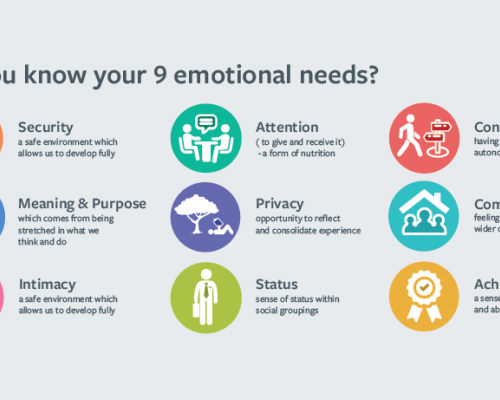Imagine
If people are suffering emotional distress there will always be unmet emotional needs, this is how the Human Givens approach works.
Imagine a life in which you had a safe place to live, had a fair degree of control over how things went, were able to give and receive attention with other people, had a satisfactory relationship and were part of a wider social group, had status in the community, self-esteem as a result of others' knowing that you did things well, were involved in challenging things to do that stretched you but were achievable and gave you the feeling that life is meaningful.
That would feel pretty good, wouldn't it? And if you are one of those lucky enough to meet all those conditions, and who hasn't been traumatised or conditioned by harmful ideas or behaviours, we could be pretty sure you had a stable and pleasant mental state.
Unfortunately not all people are so fortunate.
Many millions of people in any Westernised society are unhappy at any one time, and the problem of what to do about the rising levels of anxiety, anger, depression, addiction etc, is getting more urgent. Moreover there are an unhelpfully large number of psychotherapeutic models claiming to show how the mind works and how best to help people with emotional problems, but they almost all derive from an arbitrary theoretical perspective or from observation of some limited part of human behaviour.
You may have heard of some of these and they all contain partial truths; person-centred counselling, psychodynamic counselling, cognitive behavioural therapy (CBT), rational emotive behaviour therapy (REBT), neurolinguistic programming (NLP), choice therapy, hypnotherapy, behavioural therapy and so on.
There is also the medical model that believes emotional problems are caused by chemical imbalances in the brain and that drugs are usually the best treatment.
The human givens framework is different. It goes beneath theory and partial observation, to the level of nature itself and our evolutionary inheritance. It then becomes apparent that the conditions mentioned above — security, attention, relationships, connection into the community, status, control, being stretched etc, — are not just pleasant things to have but essential emotional needs that have to be met in a balanced way if we are to be mentally healthy. If you are a gardener you will probably agree that certain conditions must be met in order to produce, for example, great potatoes. The same holds for people (though the conditions may be different!).
Given the right conditions, people can learn, co-operate and develop to their full potential. But if they are constantly fighting a rearguard action against the stresses created by conditions that are less than ideal, they do not have the capacity to do this. The Human Givens Institute is the organisation for people who are interested in following the implications of this understanding in practice, and the implications are huge.
HGI members in MIND, for example, have found that attending to the essential emotional needs of depressed, homeless, disaffected and even psychotic people will normalise their behaviour much faster than any previous approach. A group of children's homes has discovered that the human givens approach helps even the most disturbed children to calm down and engage in educational and social development. GPs are starting to use an HGI emotional needs assessment as a diagnostic tool with patients who have unexplained physical symptoms. Diplomats are using this approach in their work with communities in conflict. And so on.
The human givens approach works beautifully in psychotherapy and counselling; if people are suffering emotional distress there will always be unmet emotional needs, and helping patients to rediscover their own resources and use them to meet the missing needs is a powerful way to resolve the distress.
It also transforms the effectiveness of teachers in schools, managers in business, and people in many other organisations because it incorporates a philosophy that says “everyone should be getting their innate needs met by what we are doing”. (This is much more profound than seeking a conventional 'win-win' solution to negotiation resolution.)
Life works better if you work with the grain of human nature, a simple and intuitively obvious idea whose time has now arrived. If you are wondering how your own field of work might improve if the barriers to human satisfaction were removed, find out more from our many articles.
Latest Tweets:
Tweets by humangivensLatest News:
HG practitioner participates in global congress
HG practitioner Felicity Jaffrey, who lives and works in Egypt, received the extraordinary honour of being invited to speak at Egypt’s hugely prestigious Global Congress on Population, Health and Human Development (PHDC24) in Cairo in October.
SCoPEd - latest update
The six SCoPEd partners have published their latest update on the important work currently underway with regards to the SCoPEd framework implementation, governance and impact assessment.
Date posted: 14/02/2024













